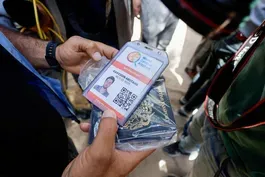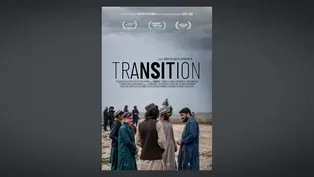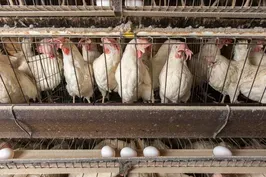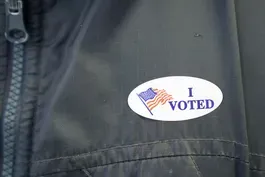
Japanese PM on cooperation with U.S. to counter China
Clip: 4/4/2024 | 11m 48sVideo has Closed Captions
Japanese prime minister on strengthening military cooperation with U.S. to counter China
The challenge presented by China is one of the main focuses of the Biden White House. The president will soon meet with the leader of Japan, one of America's strongest allies, in a bid to deepen the military partnership in East Asia. Geoff Bennett sat down with Prime Minister Fumio Kishida to discuss the stakes of the summit.
Problems with Closed Captions? Closed Captioning Feedback
Problems with Closed Captions? Closed Captioning Feedback
Major corporate funding for the PBS News Hour is provided by BDO, BNSF, Consumer Cellular, American Cruise Lines, and Raymond James. Funding for the PBS NewsHour Weekend is provided by...

Japanese PM on cooperation with U.S. to counter China
Clip: 4/4/2024 | 11m 48sVideo has Closed Captions
The challenge presented by China is one of the main focuses of the Biden White House. The president will soon meet with the leader of Japan, one of America's strongest allies, in a bid to deepen the military partnership in East Asia. Geoff Bennett sat down with Prime Minister Fumio Kishida to discuss the stakes of the summit.
Problems with Closed Captions? Closed Captioning Feedback
How to Watch PBS News Hour
PBS News Hour is available to stream on pbs.org and the free PBS App, available on iPhone, Apple TV, Android TV, Android smartphones, Amazon Fire TV, Amazon Fire Tablet, Roku, Samsung Smart TV, and Vizio.
Providing Support for PBS.org
Learn Moreabout PBS online sponsorshipGEOFF BENNETT: The challenge presented by China is one of the main focuses of the Biden White House.
And, soon, the president will meet with the leader of one of America's strongest allies, Japan, in a bid to deepen the military partnership in East Asia.
In a moment, I will speak with Japan's prime minister, Fumio Kishida, but, first, a look at the stakes of the coming summit.
Next week, a new plan to strengthen military cooperation is expected to be unveiled by two powerful leaders.
President Biden will host Japanese Prime Minister Fumio Kishida in Washington on Wednesday, followed by a summit among the two nations and the Philippines.
It's all part of Japan's shift in military strategy over the last decade, slowly abandoning its post-World War II inward-looking approach of pacifism to deal with the rising power nearby, China.
The PRC's military activities in the region are seen as increasingly aggressive, live-fire military exercises off the coast of Taiwan, sailing at ships dangerously close to others in the South China Sea, and ramming boats from the Philippines in disputed waters.
China also claims sovereignty over the Senkaku Islands, which Japan considers its own territory.
In turn, Prime Minister Kishida vowed to increase military strength to deter the PRC.
FUMIO KISHIDA, Japanese Prime Minister (through translator): In the face of a severe security environment, the drastic strengthening of our defense capabilities is an urgent task that we have no time to wait for.
GEOFF BENNETT: All of this is driving the U.S. and Japan to improve joint military operability, but, on the economic front, a new flash point.
The Biden administration last month came out against the Japanese company Nippon Steel's $14.1 billion offer to buy Pittsburgh-based U.S. Steel, saying in a statement: "It is vital for it to remain an American steel company that is domestically owned and operated."
Nippon Steel fired back, saying the deal would "advance American priorities by driving greater quality and competitiveness, while strengthening American supply chains."
That's as the White House makes clear it does not want to damage its relationship with Japan.
JOHN KIRBY, NSC Coordinator For Strategic Communications: The president has also been clear about making sure that steelworkers in this country know that he has their back.
But that doesn't take away one bit from the terrific relationship that we have now and will continue to have with Japan.
GEOFF BENNETT: Overnight, I spoke with Prime Minister Kishida from his residence in Tokyo.
Prime Minister Fumio Kishida, welcome to the "NewsHour."
One of the key items on your agenda next week is focused on Nippon Steel.
President Biden is opposed to the planned sale of U.S. Steel to Nippon Steel of Japan, and he suggests that it's a national security issue.
In his words, he says: "The U.S. needs to maintain strong American steel companies powered by American steelworkers."
Do you feel President Biden is making a mistake?
FUMIO KISHIDA (through translator): Well with regard to the specific case of U.S. Steel, since the individual discussions are going on amongst the direct parties concerned, I would choose not to directly comment on it.
However, with regard to the Japan-U.S. alliance, it is stronger than ever, and Japan has grown to be now the world's largest foreign investor in the United States and creates lots of jobs in the United States.
And it is expected that this investment is going to be expanded even further.
So, in order to make this trend for win-win more firm and definite, I think what we need to do is to ascertain sustainable and inclusive economic growth in the Asia-Pacific and work together so that rule-based economic order can be sustained and maintained.
And, based on that, the basic notion the economic front as well, I will continue to work strongly towards it.
GEOFF BENNETT: While you're in Washington next week, you and President Biden will agree to tighten military cooperation.
Japan wants to establish the joint command headquarters before the end of March 2025 because of the concern about China.
What will this strengthened U.S.-Japan military relationship be able to do in the future that it can't do right now?
FUMIO KISHIDA (through translator): I have seen in the Russian aggression against Ukraine, as well as the situation in Israel-Palestine, in terms of the international community, it is really faced with a historical turning point.
In that context, I'm of the view that the importance of the Japan-U.S. alliance is growing even more.
And after World War II, I would say that, in terms of the inter-Pacific situation for Japan, it is the most severe and complicated situation.
That is why, at the end of 2022, Japan had put together the national security strategy, in which it was decided that the defense expenditure will be raised to 2 percent of GDP.
I hope that, in my visit to the United States at this time, Japan and the United States will be able to deepen into discussion how our security cooperation can be further expanded.
GEOFF BENNETT: Will this new headquarters be involved in actual military operations, or would it just be responsible for planning military exercises between the U.S. and Japan?
FUMIO KISHIDA (through translator): Well, based on the national security strategy that Japan has formulated, we are now planning to form the joint headquarters.
However, the control, per se, will remain individually to each of the states concerned, namely, Japan and the United States.
And under that new system, I will make sure that Japan and the United States will make that coordination accordingly.
GEOFF BENNETT: Would this new command be involved in coming to the defense of Taiwan if China were to attack Taiwan?
President Biden has said on a number of occasions that the U.S. would come to the defense of Taiwan if China were to attack it.
Will Japan do the same?
FUMIO KISHIDA (through translator): Well, I would refrain from answering your question, your hypothetical question, about Taiwan.
However, the peace and stability over the Taiwan Straits is very important, and not only for Japan's security, but also for the stability of the entire international community.
Therefore, we have always taken consistently the position that issues over Taiwan are to be resolved through dialogue in a peaceful fashion.
Of course, we will convey what we are thinking formally to China, and also continue working closely with allies like the United States and other like-minded countries, so that our position can be clearly communicated.
GEOFF BENNETT: What's your level of concern, though, about Chinese military activities in the South China Sea and elsewhere in Asian waters?
What do you believe is President Xi's ultimate goal?
FUMIO KISHIDA (through translator): Well, with regard to China, without their affording adequate transparency, they are expanding military strength in this part of the region, inclusive of the nuclear and missile capabilities in a broad way and in such a speedy fashion.
They are increasing their cooperation with Russia as well.
So, in the Sea of Japan, in the Pacific Ocean and so forth, their military activities are expanding and also becoming much more intensified.
So, we are going to ask them to raise their transparency and act, along with the international code of conduct.
GEOFF BENNETT: During the visit, as I understand it, you will also be announcing cooperation in space.
Is Japan pushing to have the first non-American on the moon, and has the U.S. agree to that plan?
FUMIO KISHIDA (through translator): With regard to space, it has been confirmed that Japan will extend its cooperation in this area.
So, this is the dream that a Japanese astronaut might be stepping his feet on the face of the moon.
I hope that, when I visit the United States, it will become one of the outcomes of the discussion.
GEOFF BENNETT: You mentioned Ukraine earlier.
Let's return to that.
Does U.S. military support for Ukraine make it harder for the U.S. to meet its commitments in Asia?
FUMIO KISHIDA (through translator): While Russia's aggression against Ukraine is a reckless deed, which shakes the foundation of the international order, with a strong sense of crisis that today's Ukraine might become tomorrow's East Asia, I have been dealing with this issue, continuing the severe sanctions against Russia and the continuing strong support to Ukraine.
And on the 19th of February, Tokyo hosted the Japan-Ukraine Conference on Economic Growth and Reconstruction.
And based on that, of course, Japan will continue its cooperation to Ukraine.
And of course, the international community has to cooperate in sending strong messages constantly to Russia, because some of the Asian countries might take it wrong.
GEOFF BENNETT: Do you believe that support for Ukraine, as many in the U.S. argue, is important as a possible deterrent to China in the region?
FUMIO KISHIDA (through translator): We really need to maintain international order, which is based on the rule of law and which is free and open.
And we should never allow any country to make it a habit to be aggressive against others.
And if that is allowed, then that would send the wrong message to countries all over the world, including Asia.
GEOFF BENNETT: The North Koreans launched another ballistic missile this week.
How much of this new military partnership is about containing the North and its aggression?
And what's your level of concern about the apparent military cooperation among China, Russia and the DPRK?
FUMIO KISHIDA (through translator): Of course, the nuclear and missile development by DPRK threatens not only Japan, but also the peace and stability of the entire international community.
I sense that, very lately, the level of DPRK missile development capability is improving very significantly.
That is what I sense, and I have a deep sense of crisis over that.
Therefore, the cooperation amongst allies and with like-minded countries, specifically between Japan, the United States and the Republic of Korea, we really need to enhance our cooperation.
And, as you had mentioned, it is reported the DPRK is having a concrete cooperation with Russia.
So this is, of course, the concern shared by East Asian countries.
Therefore, the international community has to cooperate even more.
GEOFF BENNETT: And lastly, sir, Japan was one American ally that managed to get along with former President Donald Trump.
How were you able to do that?
And if Donald Trump is reelected, what advice do you have to U.S. allies about how to interact with him?
FUMIO KISHIDA (through translator): During the days of Prime Minister Abe with President Trump, efforts were made to make even more fulfilling the contents of the U.S.-Japan relationship.
And it continues to this day.
So I would say that, regardless of the outcome of the upcoming presidential election in the United States, because of this more complicated international situation, the Japan-U.S. alliance grows in importance even more.
And I believe this is a notion shared as a common recognition within the U.S., going beyond party lines, in a bipartisan way.
So that is why I have decided to visit the United States, this time to confer once again this relationship, the importance of our alliances, and to continue efforts so that we can further develop our relationship.
I hope that the Japan-U.S. alliance will be understood as very important, not only in the security area, but also in economics as well.
So I hope that the U.S. will be able to reaffirm once again how important Japan is as their partner, and we hope to confirm that during my visit to the United States.
GEOFF BENNETT: Japanese Prime Minister Fumio Kishida, thank you for your time this evening.
We appreciate it.
FUMIO KISHIDA (through translator): Well, thank you.
I'd like to thank you from the bottom of my heart, and I thank you once again for your cooperation.
Biden warns Israel to protect civilians, aid workers in Gaza
Video has Closed Captions
Clip: 4/4/2024 | 4m 40s | Biden warns Israel to protect civilians, aid workers in Gaza or risk losing U.S. support (4m 40s)
Film captures gender transition of journalist in Afghanistan
Video has Closed Captions
Clip: 4/4/2024 | 7m 6s | Documentary captures journalist's gender transition while embedded with Taliban (7m 6s)
Growing concerns about bird flu cases in U.S. farm animals
Video has Closed Captions
Clip: 4/4/2024 | 6m 37s | Growing concerns about bird flu cases in U.S. farm animals and risk to humans (6m 37s)
How Biden and Trump are spending campaign advertising funds
Video has Closed Captions
Clip: 4/4/2024 | 5m 40s | How Biden and Trump are raising and spending their campaign advertising dollars (5m 40s)
What asylum-seekers face at border after grueling journey
Video has Closed Captions
Clip: 4/4/2024 | 11m 20s | What asylum-seekers face at the U.S. border after a grueling journey through Mexico (11m 20s)
Providing Support for PBS.org
Learn Moreabout PBS online sponsorshipSupport for PBS provided by:
Major corporate funding for the PBS News Hour is provided by BDO, BNSF, Consumer Cellular, American Cruise Lines, and Raymond James. Funding for the PBS NewsHour Weekend is provided by...
















